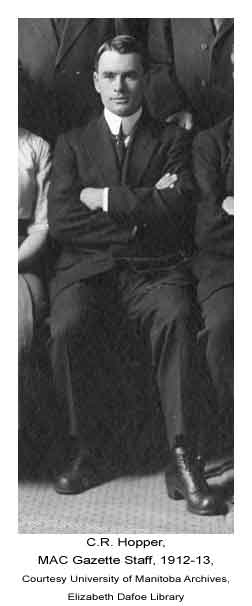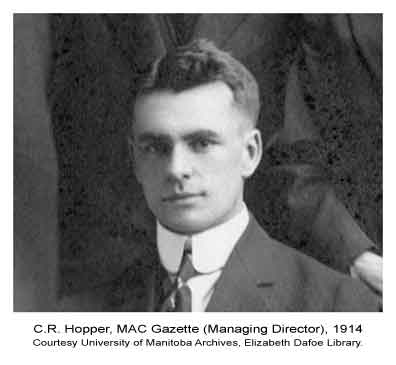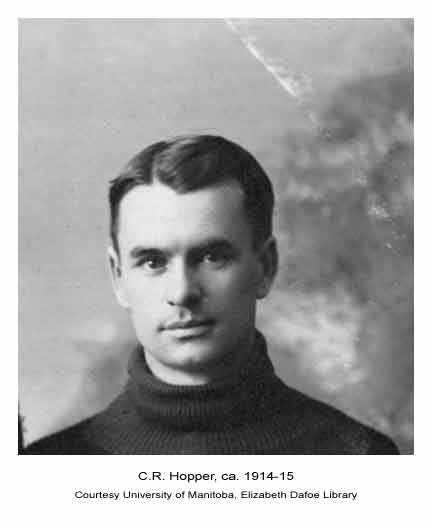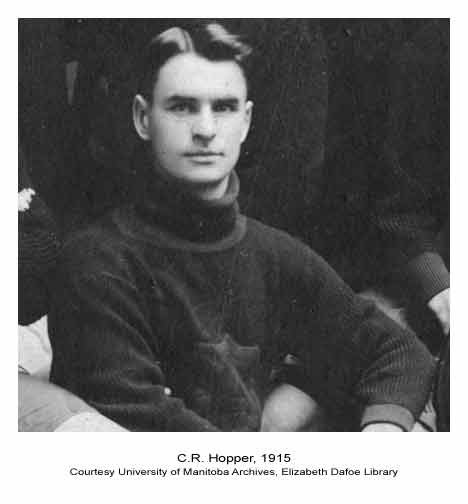



SSNS Home > Senior Years > Curricula 9-12 > Grade 11 > Canadian History > Remembrance Day > MAC Soldiers > Hopper, Clark
 |
 |
|
 |
 |
Hopper, Clark Reid, B.A., Assistant Lecturer in English at Manitoba Agricultural College, 400 Administration Building. Medals/Honours: Military Cross (MC). Military Service: Lieutenant, Reg. No. 910011, 196th Bn. (11th Brigade, Machine Gun Section) Attestation Papers. Diary References: “Letters from [C.R. or R.M.] Hopper, Miss Spackman, Mrs. Pulman, home,” 2:28 Dec ’15; “Wrote to [C.R. or R.M.] Hopper, Miss Spackman, Hilda A.R., Frank Bingham and Mrs. Pulman,” 2:2 Jan ’16; “Letter from [C.R. or R.M.] Hopper. Wrote an answer,” 2:15 Apr ’16; “ … Acting Town Major today gave me a recommendation for a commission. Will write Major Nevin [Niven] and Lt. [C.R.] Hopper also for one and then we’ll see what can be done,” 4:22 Dec ’16. Picture of him in Roll of Honour Plate XI; other pictures as well.
Additional Biographical Information:
Clark Reid Hopper was brother of Robert Milton “Roy” Hopper.
1912
Mr. Hopper joined the staff of M.A.C. in the fall of 1911 as a lecturer in English, but also taught History and Agricultural Economics. Born and raised on a farm near Newdale, Manitoba, Mr. Hopper received his elementary and high school training at Rapid City, after which he attended normal school at Winnipeg to become a teacher. He entered college in 1907 where he excelled as a student, public speaker, and athlete. “Winning scholarships in his junior years, he graduated with high honors in political economy and English.” For some years, he was also a member of the intercollegiate champion debating team. In athletics, he served on the hockey and football teams and was captain of the senior football team during his graduating year.
The M.A.C. Gazette, v. VI, no. 1 (Oct. 1912), p. 54-55.
1917
Member of Staff, Lieut. Clark R. Hopper, Military Medal, 11th Brigade, Machine Gun Sec.
University of Manitoba, Archives and Special Collections, Managra, v. XI, No. 1 (Nov 1917), 6.
1918
Lieut. C. R. Hopper
Dear Jackson:
Your very welcome letter of September 17th was waiting for me on returning from leave, about the first of the month. It would have been answered sooner if it had not been for the many distractions to be found around the convalescent home named above.
In some way I managed to develop trench fever while away on leave and only got back to go away almost immediately to hospital. It was not a very severe attack of fever and was over in two weeks, but the M.O. insisted on sending me down here on the south coast of France for a couple of weeks. I say insisted, but my obedience was wonderfully prompt. I had heard of the Riviera and the fame of the Lady Michelham Home had spread widely.
We are the guests here of Lady Michelham at the Hotel du Cap Martin, one of the very best hotels on the Riveria [sic], now turned over entirely to our use. The Emperor Francis Joseph used to stay here and Queen Victoria at one time, so you may imagine it is a pretty fair billet.
I have been here almost ten days now and during the whole time the weather has been absolutely perfect. We have had excursions to Nice in one direction and across the Italian frontier in the other; also up the hills in all directions to where we can see the snow-clad summits of the Swiss Alps. We have also been into Monte Carlo frequently of course, and to the Casino, but we are not permitted to enter the gaming rooms; but of course we would not think of doing so anyway.
No doubt you have been down here in your rambles and are familiar with the Riveria [sic - Riviera], but it is all very new to me and to most of the Canadians here and we have certainly enjoyed the change and rest. It is the first time I have had the pleasure of seeing oranges on the tree. The hills are terraced almost to the very top, and there are orange, lemon and olive orchards everywhere up the sides. And then the palm trees and magnolias and even banana trees – it is some change from the Ypres salient and Passchendale ridge, believe me. I am trying not to think of the change it will be from a big room looking over the Mediterranean to a vermin infested dugout with a candle and a pile of sand bags.
Since receiving your letter I have heard from both Prof. Sproule and Prof. Brodrick, so am getting pretty well up in college news again.
I have not seen any of the boys from the M.A.C. for some time now. My brother was able to get leave from the M.G. Depot, while I was back there on leave and it greatly improved matters. There is no place so lonesome as London if one is alone. The English and the Imperial troops generally have a great advantage over us in being able to get actually home while on leave.
While on leave, we went up to Manchester to see Nels Young, who lost a leg last summer. He is doing well and enjoying life yet as well as most of us.
The war just now seems to be in a much more hopeful situation again than it was a week or two ago. The submarine situation was the best last week it has ever been. The Italians are holding; Allanby is having great success, and just the night before last General Byng, with the 3rd Army, had one of the big successes of the year on an entirely new plan. And about two weeks ago everything looked black. It is a remarkable thing though that success or failure, even on a large scale, seems to make very little difference to the spirits of officers or men. The only importance attached to either success or failure is simply to hasten or delay an ultimate result that no one has ever had in doubt.
I must pass on to some of the other letters which arrived in the last couple of mails. When letters do reach us over here, they generally come in large bunches.
With kindest regards to Mrs. Jackson and Jean.
Very sincerely yours
Clark R. Hopper
University of Manitoba, Archives and Special Collections, Managra, v. XI, No. 3, (Jan. 1918), 32-33.
1919
Captain C. R. Hopper, M.C.
Before joining the army, Mr. C. R. Hopper was a member of the staff in the English Department of the Manitoba Agricultural College. He enlisted in February, 1916 with the Agricultural College Platoon of the 196th Battalion, at the same time studying for his lieutenancy. He got his commission as Machine Gun Officer of the 196th Battalion in May. Soon after this he married Miss E. Cuthbert, a sister of Miss Cuthbert now at the M.A.C., and went to Ottawa to take a six weeks musketry and machine gun course.
The 196th Battalion went overseas in October, 1916, and Lt. Hopper spent two months with them at Seaford, before transferring to the Canadian Machine Gun Corps, in which he spent four months training at Crowkors. He went to France in May, 1917 to the 4th Canadian Division. That summer he took part in the fighting around Lens and in August received a Military Cross.
The machine guns were reorganized in the spring of 1918 into the Battery system, a battery consisting of 8 Vickers Machine Guns with a personnel of 4 officers and 111 other ranks, and twenty-six horses. During the summer of 1918, the Canadian Corps had twelve such batteries per division. During August and September of that year Lt. Hopper took part in the battles of Amiens, Arras and Cambrai. After the battle of Amiens he was promoted to the rank of captain and placed in charge of a Machine Gun Battery. He was recommended for a bar to the M.C. after the second battle of Arras, and was wounded on October 1st.
Captain Hopper has come back to the position which he vacated by enlisting in 1916, and which was held open for him. He resumed his duties toward the end of January and is as glad to get back as we are to have him with us again.
Of the boys who enlisted from M.A.C. with Captain Hopper in the University Battalion, George Watkins and Matthew Young were the only two fortunate enough to remain under his command until almost the end of the war.
University of Manitoba, Archives and Special Collections, Managra, v. XII, No. 1 (Jan. 1919), 31-32.
Athletics. An Appreciation.
We are unaware of anything that has caused more genuine sorrow than the retirement of Clarke Hopper of our college sporting activities. Through the action of the U.M. Sec. restricting sports to bona fide students M.A.C. loses one of the most spectacular and useful players that it has ever been our privilege to see in action.
For years Hopper has been the nucleus of our football and hockey activities. He has the distinct honor of being a member of every team that has brought a shield to the college and has nobly played his part in honourable defeat. This is a remarkable record and we venture to say has very few parallels in college history. His living cheerful personality and his manly way of playing the game has been one of the strongest forces for character building that we, as students, have been privileged to enjoy.
University of Manitoba, Archives and Special Collections, Managra, v. XIII, No. 2 (Dec. 1919), 42.
1923
Hopper, Clarke Reid, BA 1912; Enlisted 24-2-16; Lieut. 196th Bn.; Transferred to 4th CMGC; Service in France; MC; Wounded October 1918; Discharged Winnipeg 16-1-19.
University of Manitoba, Roll of Honour 1914-1918 (Winnipeg: University of Manitoba, 1923), 70. (Plate XI).